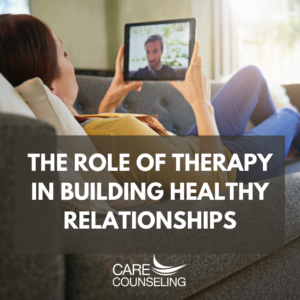The Role of Therapy in Building Healthy Relationships
 Healthy relationships are the cornerstone of a fulfilling life, contributing to our emotional well-being, personal growth, and overall happiness. However, building and maintaining these relationships can be challenging, as they often come with complex dynamics, communication issues, and unresolved conflicts. This is where therapy plays a pivotal role. In this blog post, we will explore how therapy can be a powerful tool in building and nurturing healthy relationships.
Healthy relationships are the cornerstone of a fulfilling life, contributing to our emotional well-being, personal growth, and overall happiness. However, building and maintaining these relationships can be challenging, as they often come with complex dynamics, communication issues, and unresolved conflicts. This is where therapy plays a pivotal role. In this blog post, we will explore how therapy can be a powerful tool in building and nurturing healthy relationships.
Understanding the Need for Relationship Therapy
Before delving into the role of therapy in relationships, it’s essential to recognize common challenges that individuals and couples often face:
- Communication Issues: Misunderstandings, poor communication, and misaligned expectations can lead to frustration and conflict in relationships.
- Conflict Resolution: Conflicts are natural, but the way they are resolved can impact the health of a relationship. Unresolved conflicts can fester and create resentment.
- Intimacy and Connection: Over time, relationships may face challenges in maintaining emotional and physical intimacy. Changes in life circumstances, stress, and personal growth can affect these aspects.
- Past Trauma and Baggage: Previous traumatic experiences or unresolved emotional baggage from past relationships can influence current ones. It’s essential to address and heal from these issues to foster healthy connections.
- Individual Well-Being: Healthy relationships are built on the foundation of two emotionally healthy individuals. Addressing personal mental health challenges is crucial to the health of any relationship.
The Role of Therapy in Building Healthy Relationships
- Enhanced Communication Skills
Therapy provides individuals and couples with the tools and strategies to improve communication. Effective communication is the cornerstone of any healthy relationship. Therapists help clients learn how to express their thoughts and feelings, listen actively, and navigate difficult conversations with empathy and understanding.
- Conflict Resolution
Therapy equips individuals with conflict resolution techniques, helping them address disputes in a constructive and non-destructive manner. By learning how to navigate conflicts, couples can resolve issues while preserving their emotional connection.
- Emotional Healing and Resilience
For those carrying emotional baggage from past experiences, therapy offers a safe space to heal and process these emotions. This emotional healing is essential for individuals to approach relationships with a clean slate, free from the burdens of the past.
- Identifying Unhealthy Patterns
Therapists can help individuals and couples identify and break unhealthy relationship patterns. These patterns often stem from past experiences and can include issues such as codependency, passive-aggressive behavior, or avoidance. Recognizing and addressing these patterns is crucial for building healthier relationships.
- Improved Self-Understanding
Healthy relationships require self-awareness and self-acceptance. Therapy can aid individuals in understanding their own emotions, triggers, and needs. When individuals have a deep understanding of themselves, they are better equipped to express their needs and boundaries in relationships.
- Building Trust and Intimacy
For couples struggling with trust issues or intimacy challenges, therapy provides a safe environment to explore these issues. Therapists can guide couples in rebuilding trust and enhancing emotional and physical intimacy.
- Navigating Life Transitions
Life transitions, such as marriage, parenthood, career changes, or loss, can stress even the strongest relationships. Therapy can help couples navigate these transitions, adapt to changes, and support each other through the challenges they bring.
- Individual and Couples Counseling
Therapy can take various forms, including individual counseling and couples therapy. In individual counseling, each person in the relationship can work on personal growth, address mental health issues, and develop the skills needed to contribute positively to the relationship. Couples therapy involves both partners in joint sessions to address relationship dynamics and conflicts.
Choosing the Right Therapist
To maximize the benefits of therapy for your relationship, it’s crucial to find the right therapist:
- Credentials: Ensure that the therapist is a licensed mental health professional with experience in couples or relationship therapy.
- Approach: Different therapists use different therapeutic approaches. Research and discuss with potential therapists to find an approach that resonates with you and your partner.
- Compatibility: Building a trusting and open relationship with your therapist is essential. It’s okay to try out a few therapists until you find one that feels like the right fit for you and your partner.
- Goals and Expectations: Communicate your goals and expectations for therapy with your therapist. Be clear about what you hope to achieve in your relationship through therapy.
Healthy relationships are worth the effort and investment, as they contribute significantly to our overall well-being and happiness. Therapy serves as a valuable resource for individuals and couples looking to build, strengthen, or heal their relationships. By addressing communication issues, improving conflict resolution skills, and fostering emotional healing, therapy can pave the way for healthier and more fulfilling relationships.



























